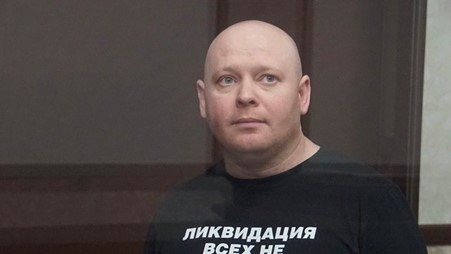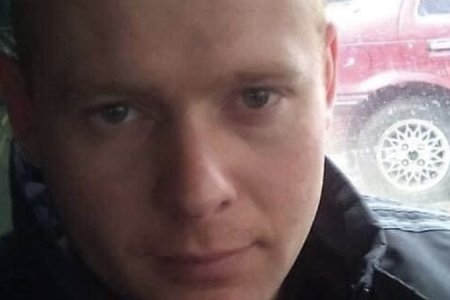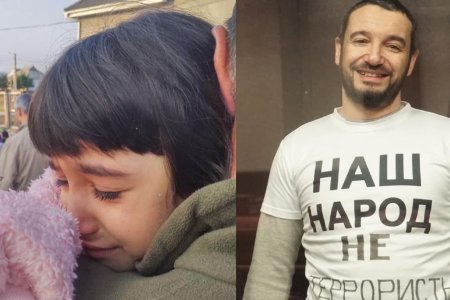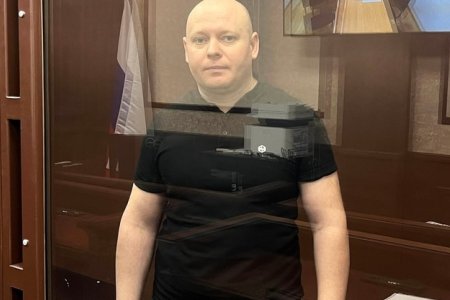
Russia’s notorious Southern District Military Court has sentenced 34-year-old Ametkhan Abdulvapov to ten and a half years’ harsh-regime imprisonment on the basis solely of an innocuous conversation seven years ago and implausible ‘testimony’ of an anonymous witness.
The prosecution was unable to explain how the conversation constituted ‘terrorism’, and why, if they claimed it did, the FSB had done nothing about it for so many years. None of this, nor other glaring flaws in the case, were of any concern to presiding judge Igor Kostin, Roman Plisko and Alexei Sannikov who, on 15 March 2023, provided the ‘guilty’ verdict required. The sentence was lower than the 12 years demanded by prosecutor Vladislav Kuznetsov, but they still knowingly imprisoned an innocent man for over a decade. The first three years of the sentence were ordered to be in a Russian prison, the harshest of all Russia’s appalling penal institutions, with the rest of the time in an only marginally better harsh-regime prison colony.
Refat Yunus, one of Abdulvapov’s lawyers, said that the defence will be lodging an appeal, and consider such a verdict to be unlawful and without foundation. The assessment is spot on, and not only because Russia is in flagrant violation of international law by illegally imposing its repressive legislation on occupied Ukrainian territory. Abdulvapov was charged only with totally unproven involvement in Hizb ut-Tahrir, the transnational Muslim party which is legal in Ukraine. In a secretive and almost certainly politically-motivated ruling in February 2003, Russia’s Supreme Court labelled Hizb ut-Tahrir ‘terrorist’. It provided no explanation for such a ruling against an organization not known to have committed acts of terrorism anywhere. Since the beginning of 2015, Russia has been using alleged involvement in Hizb ut-Tahrir as justification for serious ‘terrorism’ charges in occupied Crimea. The prosecutions have received international condemnation, not only because they violate international law, but because they are evidently used as a weapon to try to silence Crimean Tatar civic journalists and activists, and crush the important Crimean Solidarity human rights movement.
Although, as Abdulvapov noted during his final address, he had nothing at all to do with ‘terrorism’, the unexplained Supreme Court ruling back in 2003 was deemed sufficient to charge him under two terrorism articles of Russia’s criminal code, with each envisaging huge sentences. Abdulvapov, a 34-year-old mechanical engineer, who is married with two children and had never had any problems with the law, was accused of ‘involvement in a Hizb ut-Tahrir group’ under Article 205.5 § 2, and the totally surreal ‘Article 278’, ‘planning a violent seizure of power and change in Russia’s constitutional order”. During the armed ‘search’ of Abdulvapov’s home on 9 February 2022 and his arrest, no pretence was made of looking for weapons or ammunition. In Abdulvapov’s case, the FSB were clearly only interested in ‘prohibited literature’ which they, on this occasion and increasingly often in Crimea, brought with them and planted. The defence’s request to test the books that the FSB claimed to have ‘found’ for fingerprints was without any good reason rejected by the court.
Although the two men were arrested and different times, and ‘tried’ separately, Abdulvapov’s case is linked with that of Raif Fevziev, a local Imam and a civic activist, who held prayer services on the eve of politically motivated sentences and also attended political ‘trials’. The ‘cases’ of both men are based on an illicitly taped conversation on religious issues back in December 2015, in Fevziev’s own home and on the ‘testimony’ of one or two secret witnesses, including the individual known as ‘Ismailov’ in Abdulvapov’s case. Seven years after the conversation, the same Russian court, under different judges, sentenced Fevziev to 17 years on the same preposterous articles. The much longer sentence in Fevziev’s case was that he was charged under paragraph 1 of Article 205.5 (‘organizing a Hizb ut-Tahrir group). Abdulvapov was accused only of ‘involvement’ in this entirely unproven ‘group’,
The courts trying both men ignored the fact that there was no proof that any ‘witness’ had grounds for having his identity (and even voice) concealed. They were equally unconcerned by Ismailov giving ‘testimony’ that corresponded, almost word for word, with the original protocol, but being unable to accurately answer even the simplest question put by the defence. This persona claimed that he had met Abdulvapov in the middle of 2015 at the home of Raif Fevziev, where meetings supposedly took place involving discussion of religious issues concerning the laws of a state with an Islamic form of government and the recruitment of new members of the ‘organization’. ‘Ismailov’ asserted that Abdulvapov gave off the impression of a person understanding ideology. He was unable to cite even one example of unlawful behaviour.
Please write to Ametkhan Abdulvapov!
Ametkhan is likely to remain imprisoned in Rostov (Russia) until the appeal hearing. All letters tell him that he is not forgotten and show Moscow that such political trials are under scrutiny. Letters need to be in Russian, and on ‘safe’ subjects. If that is a problem, use the sample letter below (copying it by hand), perhaps adding a picture or photo. Do add a return address so that Ametkhan can answer.
Sample letter
Привет,
Желаю Вам здоровья, мужества и терпения, надеюсь на скорое освобождение. Простите, что мало пишу – мне трудно писать по-русски, но мы все о Вас помним.
[Hi. I wish you good health, courage and patience and hope that you will soon be released. I’m sorry that this letter is short – it’s hard for me to write in Russian., but you are not forgotten. ]
Address
344022, Россия,, Ростовская обл., г. Ростов-на-Дону, ул. Максима Горького, 219, ФКУ СИЗО-1
Абдулвапову, Аметхану, г.р.
[Or in English: 344022 Russian Federation, Rostov on the Don, 219 Maxim Gorky St, SIZO-1
Abdulvapov, Ametkhan, b. 1989 ]



